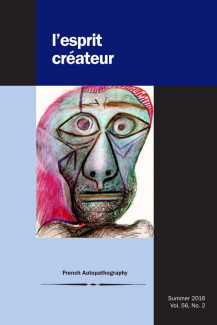
Johns Hopkins UniversityEst. 1876
America’s First Research University
Linking Medicine, Narrative and French

Earlier this year, the journal L’Esprit Créateur published a special issue on the links between medicine and narrative, arguing that patients’ stories have a valuable role to play in patient-centered healthcare. Guest edited by Steven Wilson, the issue looked at the ways in which first-person expressions of embodied experience may contribute to medicine’s empathetic endeavor as well as the lack of research to date into autopathography in the French-speaking world. Wilson, a Lecturer in French Studies at Queen's University, Belfast, joined us for a Q&A about the issue.
How did you get involved with the special issue?

What is the value in exploring the intersection between medicine and language?
The English physical chemist and novelist C. P. Snow famously argued – and lamented – in his seminal 1959 lecture, The Two Cultures, that the relationship between science and the arts was one of deep mutual suspicion. As Foucault so memorably put it in Naissance de la clinique (1963), the authority of medicine means that the patient is often subjected to “the medical gaze” – a dehumanizing separation of minute entities of the body from his or her integral identity as a person experiencing a potentially bewildering, frightening, transformative experience. Sociologist Arthur Frank put it slightly differently when he said that the dominant authority of medicine conspires to “take away voice” – to overpower the patient’s voice with specialist medical discourse. In recent years, inspired by the expanding field of enquiry that is the medical humanities, scholars have begun to question the potential of the patient’s voice to reveal the human experience of illness, disability, and medical care. By focusing on first-person accounts, what we sought to do in our special issue of L’Esprit Créateur was to probe the creative potential that lies at the interface of medicine and the arts. In particular, we wanted to use first-person accounts to enquire into what it is like to be human and ill or disabled, and what first-person expressions of subjective experience can tell us about illness and disability. Our motivating force throughout was a conviction that the arts and humanities have the potential to shed important new light on complex, multifaceted experiences of pain, suffering, and patienthood that medical discourse cannot adequately describe on its own.
What unique perspective could L'Esprit Créateur bring to the discussion?
L’Esprit Créateur was always the obvious journal for us to approach when we had put together a publication proposal. Not only is its scholarly reputation impeccable, but its strong and historical commitment to innovative, interdisciplinary thought, and its reputation for promoting original thinking and permitting engagement with emerging ideas, offered a perfect “fit” for a project that spanned first-person representations of, among others, self-harm, AIDS, cancer, locked-in syndrome, and anorexia, from the nineteenth century to the present day. The fact that the journal actively embraces methodological diversity allowed for a range of approaches in the special issue, and its international reputation gives us an opportunity to contribute not only to research on medicine, language and the arts within French Studies, but to the humanities more broadly.
What kind of things did you learn in pulling together the issues for the issue?
The most important thing we learned from our collaborative project is that autopathographies reveal valuable subjective knowledge that, when situated alongside specialist medical knowledge, affords a more complete understanding of the lived experience of illness or disability. From this, various conclusion emerge: firstly, that the author-narrator of autopathography gains a voice that is empowering; and secondly, that this voice constitutes a vital element of good patient care, or what is increasingly referred to as the ideal of “patient-centred medicine.” As Rita Charon has proposed, if the patient’s voice is more actively listened to, then “narrative medicine” – or enhanced narrative competence on the part of medical professionals – has the potential to lead to more effective and humane healthcare. We nonetheless recognise there is more work to be done on autopathographies, not least the democratic and ethical issues raised by the prevalence of online autopathographies in recent years. We therefore hope that our special issue of L’Esprit Créateur on French autopathography will incentivise further research in this rich and stimulating area.


